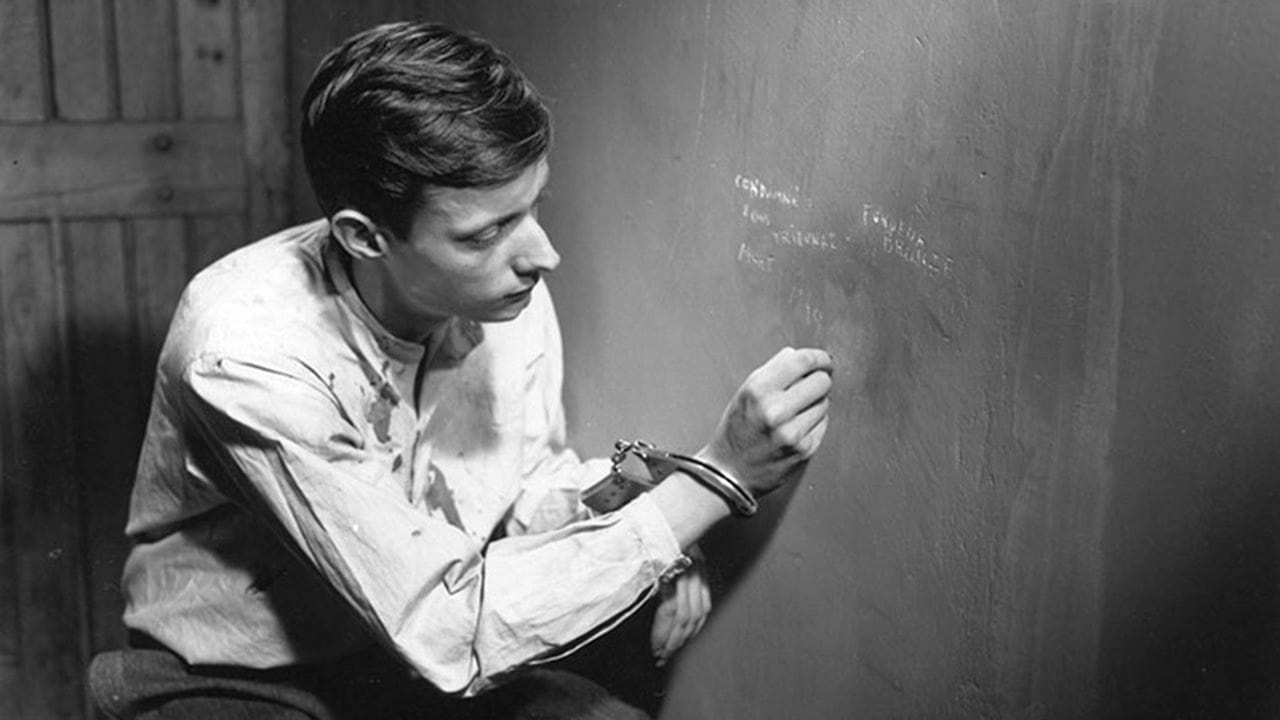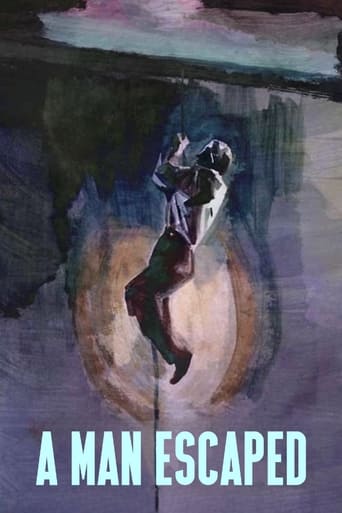

A Disappointing Continuation
... View MoreWhile it doesn't offer any answers, it both thrills and makes you think.
... View MoreOne of the best movies of the year! Incredible from the beginning to the end.
... View MoreOne of the best movies of the year! Incredible from the beginning to the end.
... View MoreFor a film thats main spoiler is the title itself, Bresson still manages to maintain a high level of suspense from the opening credits until the closing scene. This is due to the minimalistic nature of the film, the cinematography and dialogue are barebones so that every detail we are shown is purposeful and undeniably part of Fontaine's plan, and although an inexperienced actor at the time, the pathos demonstrated through François Leterrier and the persistence of his character make every little victory a meaningful landmark towards the inevitable escape.
... View MoreThose who have been brought up on Hollywood prison escape films may find their patience tried by "A Man Escaped." This isn't an especially dramatic prison break movie, and we don't learn much about the main character, certainly not enough to have a huge rooting interest in him. We want him to escape because he's been imprisoned by Germans during WWII and we know the Germans were the bad guys in that conflict, but we don't think much about it beyond that. The bulk of the film details the meticulous and even rather mundane preparations that accompany this particular escape -- breaking apart a wooden door with nothing more than a spoon, making a rope out of whatever found objects one can re-purpose. I honestly wasn't that in to this movie. I appreciated its minimalist approach and its depiction of an escape as the way it would much more likely be in real life rather than the histrionic scenarios we've seen play out in other movies. But those very same qualities also by definition make it a bit less exciting. I realized that maybe what I want out of my prison break movies are unrealistic Hollywood trappings after all.Grade: B
... View MoreFrom director Robert Bresson (Pickpocket, Au Hasard Balthazar, L'Argent), I read about this film as an entry in the book 1001 Movies You Must See Before You Die, and it definitely, from the critic ratings and descriptions, sounded like a great film. Basically, set during the time of the Second World War, French Resistance member Lieutenant Fontaine (François Leterrier) is captured by the Nazis and is being taken to Montluc prison in Lyon, he attempts an escape when the car travelling is forced to stop, but he is apprehended and beaten, and handcuffed while incarcerated. He is at first in a cell on the first floor of the prison, and out of his window he is able to communicate with three French men who exercise in the courtyard, they obtain a safety pin for him and he is able to unlock his handcuffs, but this is pointless as he is soon moved to a cell on the top floor and no longer wears the handcuffs. Fontaine, now on the top floor in cell 107, notices that the boards in his jail door are joined together with low quality wood, so using an iron spoon he took after a meal he starts to chip away at the wood, after working for weeks he is able to remove three boards, walk around the hallway, and then return to his cell with the door restored. Another prisoner trying to escape is Orsini (Jacques Ertaud), but his attempt is unsuccessful as at the second wall his rope broke, he is beaten by the guards and tossed back in his cell, he is sentenced to be executed in a few days, but Fontaine is not dissuaded to continue his escape plan, using the light fitting in his cell he has made a hook and with old blankets made a rope, he fastens these together with wire from his bed. Following fellow prisoners concerned that Fontaine is taking too long to plan an escape, he is informed in headquarters that he will be executed, and returning to his cell he is soon joined by sixteen year old German army recruit cell mate François Jost (Charles Le Clainche), Fontaine is unsure whether to trust him, he has to decide whether to kill him or take him with him during his escape, the young man wants to escape also, so he is trusted. With the plan ready to go, Fontaine and Jost access the roof of the jail building, and slowly they use the hooks and ropes to climb down to the courtyard, killing the Nazi guard in their way, and then they climb over the wall and make it through an adjacent building, the film ends with the two men successfully walking out of the prison undetected. Also starring Roland Monod as Priest and Maurice Beerblock as Blanchet. Leterrier is a good choice as the leading character imprisoned and condemned, the story of this film is based on the memoirs of real life Montluc prison escapee André Devigny, the scenes were all filmed in the actual prison, and the film is full of mostly unprofessional actors, I agree films like Birdman of Alcatraz, Escape from Alcatraz and The Shawshank Redemption are indebted to this classic and fantastic prison drama. It was nominated the BAFTA for Best Film from any Source. Very good!
... View MoreBresson's intimate, claustrophobic and spirituous prison break has become an epitome of effective, atmospheric minimalist film-making. At first it might seem solecistic in its silence, but this silence is not distance, it is utmost closeness, gets us under the skin. Trussing the rope, slowly working through the wood in the door, finding the escape route – Bresson allows the silence to make us accomplices; his birr for escape is internal to the very outrance that his outward appearance signals to us nervousness, procrastination. This struggle makes the film more powerful an experience through Bresson's use of silence and closed space, and very much like in Lumet's "12 Angry Men" (1958), the space – or the lack of it thereof – becomes an irresistible force in keeping us engaged.Leterrier carries the film, as he should lest the film completely lack in purpose and turn into a miserly exercise without humanity. He manages to project nerviness and nervousness, strength and weakness, determination and vacillation simultaneously, internalizing the thought process but with his body emphasizing everything we need to know at the moment. Again, the atmosphere is so tangible you feel like you're there. The sweat, the fear, the desire.
... View More